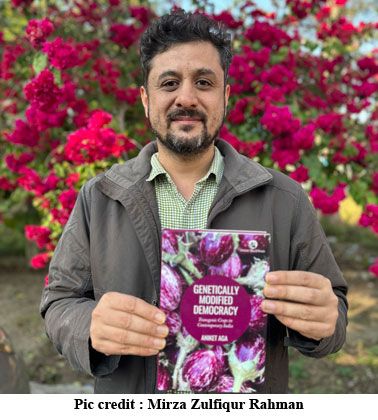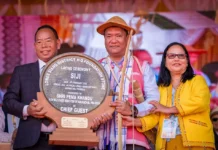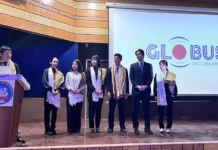[ Xonzoi Barbora ]
DIBRUGARH, 17 Dec: Prof Chandan Kumar Sharma of the Tezpur University hosted the Northeast India release of Dr Aniket Aga’s award-winning book, Genetically Modified Democracy (Yale University Press, 2021) at the Dibrugarh University in Assam on Friday.
The book release was part of a three-day workshop titled ‘Sustainable futures: Agriculture, ecology and conservation in Northeast India’, organised by the North Eastern Social Research Centre, Guwahati, and the Dibrugarh University.
Dr Aga is an associate professor of environmental studies at Delhi-based Ashoka University. His research interests are in science and technology studies, democratic politics, and agrarian studies. He works on questions of environmental justice, food democracy, and sustainable agriculture.
The South Asian edition of his book was released by Orient Blackswan publishers in December 2021. Since its publication, the book has been exceptionally well received.
Anthropologist Jacob Richardson suggests that the book provides “plenty of food for thought and a fresh perspective on a long-studied debate,” and Abby Kinchy, sociologist of science, suggests that the book should be “required reading” for anyone making political points about GM crops based on the Indian experience.
In November 2022, Genetically Modified Democracy won the Fleck Prize awarded by the International Society
for Social Studies of Science, which recognises outstanding work in the area of science and technology studies.
In its award citation, the prize committee stated that the book “is a masterful and thoroughly researched account of the making of GMO biotechnology in India and the concurrent emergence of novel matters of concern and governance forms fueled by calls for equity and justice.”
During the book release function, reiterating the words from his book, Dr Aga said, “Our focus must remain on urgent questions of food democracy, agricultural sustainability, health, and justice, rather than any one particular technology.”
In his book discussion, Prof Sharma said, “Land is becoming commodified increasingly in the region. It poses a great challenge to the biodiversity in the hills, the crops that people cultivate, and will accentuate the problem of food insecurity. The production, consumption, and preservation of food often involve the local community. Therefore, the whole rhythm of the community might also be affected when food cultures disappear.”
Oil palm cultivation started in Arunachal Pradesh in 2012. In June 2022, The Arunachal Times reported that over 3,000 hectares of land in the state are already under oil palm cultivation. In 2018, the new land settlement regulation conferred land property rights to individuals shifting away from community-owned lands under the customary law.
Heavy rainfall this year has already severely affected winter crops, especially early-yield rice and vegetable cultivation in the Siang region. Nevertheless, Arunachal and other states of Northeast India are rich in biodiversity, farming traditions and food cultures.
To improve farmers’ income and guarantee long-term ecological sustainability of the region, agricultural policies must promote decentralised, diverse food systems attuned to the region and its aspirations.
Oil palm and other monoculture plantations are ecologically devastating and are already contributing to conflicts with wildlife in Northeast India.




